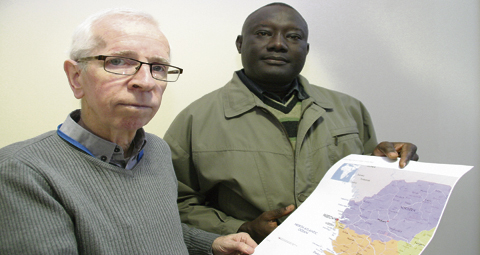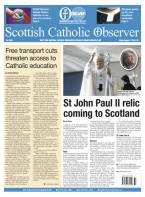December 12 | ![]() 0 COMMENTS
0 COMMENTS ![]() print
print

Ebola epidemic may trigger a social and economic crisis
A priest returning from Scotland to Ebola-hit Sierra Leone has said that the need for aid will continue for several years after the worst effects of the disease have been dealt with, Hugh Dougherty reports
Fr Bob John Koroma, who has been staying in Coatbridge with Fr Tom Welsh, director of Mission Matters Scotland, has has recently returned to his native country. Before he left, Fr Koroma said that he fears for his own health and the health of his family, as Ebola continues to take a heavy toll around his base at Makeni, at the centre of the stricken country’s Northern Province.
“The first reaction everyone has to Ebola is fear, and I am fearful of what I am going back to,” the 42-year-old, who has been a priest for 15 years, said. “Sierra Leone has not come near hitting its World Health Organisation targets of burying 70 per cent of those killed by Ebola and of isolating 70 per cent of those affected. The problem is particularly acute in the remoter country areas where I am based and a great deal needs to be done to combat the epidemic.”
Fr Koroma is very grateful to the United Kingdom for its response of sending forces to his country to set up Ebola treatment centres, but he said that the effects of the disease on Sierra Leone are as dire as its symptoms.
“There are thousands of orphans whose parents have been taken by Ebola,” he said. “We need to look after them, while thousands of families have been driven into poverty and, although the government has put people into quarantine, it makes no arrangements to bring them basic food and supplies.
“That’s where the Church comes in. We are trusted on the ground by people to help and we emphasise basic hygiene, the need to abandon traditional customs such as washing dead bodies, and we feed people and run hospitals.”
The country has been in virtual lockdown since August, and Fr Koroma fears that the Ebola epidemic is rapidly turning into a social and economic crisis which will cripple his country for decades to come. Schools, colleges, universities and church seminaries have all been closed and there are regular curfews to allow government officials to collect dead bodies for safe burial.
“As priests, too, we have to be careful,” he said. “We distribute Holy Communion only in the hand, and we can’t hold funerals or administer the last rites. Every church has a chlorine tap outside and we demand that everyone in the congregation washes their hands before coming in to pray.
“One of the very positive factors, however, is that Sierra Leone is a model of Christian and Muslim relationships. My own father was a Muslim and my mother converted to Catholicism five years ago, for example. There are no inter-faith tensions, and the whole community is pulling together to defeat Ebola.”
http://www.missionmattersscotland.org/
—Read full report in this Friday’s SCO, newspapers in parishes from December 12.











